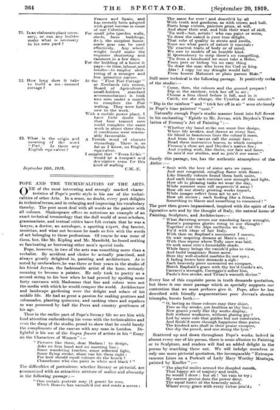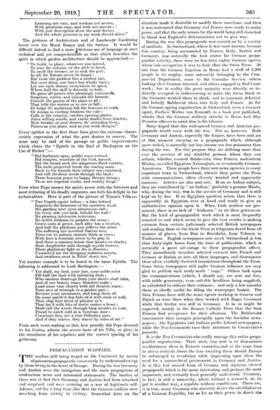POPE AND THE TECHNICALITIES OF THE ARTS.
ONE of the most interesting and strongly marked charac• teristics of Pope's poetic style is his use of the techni- calities of other Arts. In a sense, no doubt, every poet delights in technical terms, and in enlarging and improving his vocabulary thereby. The poet must deal with all words as the painter with all colours. Shakespeare offers so notorious an example of an exact technical terminology that the dull world of semi-scholars,
grammarians, and textual critics have felt certain that he was a lawyer, a doctor, an astrologer, a sporting exgert, dog fancier, musician, and what not because he made so free with the words of art belonging to these professions. Of course he was none of them, but, like Mr. Kipling and Mr. Masefield, ho found nothing so fascinating as borrowing other men's special tools.
Pope, however, in two of the arts was something more than a verbalist. By accident and choice he actually practised, and always greatly delighted in, painting and architecture. As is noted by us'elsewhere, he was three or four years in the studio of his friend Jervas, the fashionable artist of the hour, seriously meaning to become a painter. He only took to poetry as a second string to his bow when he had proved by spoiling some forty canvases with Madonnas that line and colour were not the media with which he would conquer the world. Architecture and landscape gardening were the delight and solace of his middle life. He had as great a passion for making grottoes and colonnades, planting quincunx, and ranking vines and espaliers as was possessed by half the Peers and country gentlemen of his age.
Thus in the earlier part of Pope's literary life we see him with fond attention embroidering his verse with the technicalities and even the slang of the studio, proud to show that he could bandy the compliments of the canvas with any man in London. De- lightful is his use of the lingua franca of artists in his "Essay on the Characters of Women" :- " Pictures like these, dear Madam to design,
Asks no firm hand and no unerring line ' - Some wandering touches, some reflected light, Some flying stroke, alone can hit them right : For how should equal colours do the knack ? Chameleons who can paint in white and black ? "
The difficulties of portraiture, whether literary or pictorial, are summarized with an attractive mixture of malice and obscurity in the following passage :-
" One certain portrait may (I grant) be seen, Which Heaven has varnish'd out and made a Queen :
The same for ever ! and described by all With truth and goodness, as with crown and ball.
Poets heap virtues, painters gems, at will, And show their zeal, and hide their want of skill.
'Tis well—but, artists ! who can paint or write, To draw the naked is your true delight.
That robe of quality so struts and swells, None see what parts of nature it conceals : Th' exactest traits of body or of mind, We owe to models of an humble kind.
If Queensberry to strip there's no compelling, 'Tis from a handmaid we must take a Helen.
From peer or bishop 'tis no easy thing To draw the man who loves his Cod or king.
Alas ! I copy (or my draught would fail) From honest Mehemet or plain parson Hale."
Still more technical is the following passage. It positively reeks of the studio:—
Come, then, the colours and the ground prepare ! Dip in the rainbow, trick her off in air ; Choose a firm cloud before it fall, and in it Catch, ere she change, the Cynthia of this minute."
" Dip in the rainbow " and " trick her off in air " were obviously in Pope's time painters' "cant."
Naturally enough Pope's studio manner burst into full flower in his enchanting " Epistle to Mr. Jervas, with Dryden's Trans- lation of Fresnoy's Art of Painting ":—
" Whether thy hand strike out some free design, Where life awakes, and dawns at every line, Or blend in beauteous tints the colour'd mass, And from the canvas call the mimic face ; Read these instructive leaves, in which conspire Fresnoy's close art and Dryden's native fire ; And reading wish, like theirs, our fate and fame, So mix'd our studies, and so join'd our name."
Surely this passage, too, has the authentic atmosphere of the
Atelier Smit with the love of sister arts we came, And met congenial, mingling flame with flame ; Like friendly colours found them both unite, And each from each contract new strength and light.
How oft in pleasing tasks we wear the day, While summer suns roll unperceiv'd away !
How oft our slowly growing works impart, While images reflect from art to art !
How oft review ; each finding like a friend, Something to blame and something to commend ! "
The poet then grows impassioned, inspired with the spirit of the figurative arts and by the thought of Italy, the natural home of Painting, Sculpture, and Architecture:— " What flattering scenes our wandering fancy wrought, Rome's pompous glories rising to our thought !
Together o'er the Alps methinks we fly, Fir'd with ideas of fair Italy.
With thee on Raphael's monument I mourn, Or wait inspiring dreams at Maro's urn :
With thee repose where Tully once was laid, Or seek some ruin's formidable shade.
While fancy brings the vanish'd piles to view, And build imaginary Rome anew.
Here thy well-studied marbles fix our eye ; A fading fresco here demands a sigh : Each heavenly piece unwearied we compare, Match Raphael's grace with thy lov'd Guido's air, Carracci's strength, Correggio's softer line, Paulo's free stroke, and Titian's warmth divine."
Every line of this exquisite poem in truth demands quotation. but there is one more passage which so specially supports our contention that we must perforce give it. Pope, after he has described with friendly augmentations poor Jervas's slender triumphs, bursts forth :—
" 0, lasting as those colours may they shine, Free as thy stroke, yet faultless as thy line ; New graces yearly like thy works display, Soft without weakness, without glaring gay ! Led by some rule that &ides but not constrains, And finish'd more through happiness than pains. The kindred arts shall in their praise conspire, One dip the pencil, and one string the lyre."
Scattered up and down throughout Pope's works, indeed in almost every one of his poems, there is some allusion to Painting or to Sculpture, and readers will find an added delight in the poems by searching. these out. We will indulge ourselves in only one more pictorial quotation, the incomparable "Extempo- raneous Lines on a Portrait of Lady Mary Wortley Montagu. painted by Kneller " :—
" The playful smiles around the dimpled mouth, That happy air of majesty and truth, So would I draw : but oh ! 'tis vain to try ; My narrow genius does the power deny. The equal lustre of the heavenly mind, Where every grace with every virtue join'd;
Learning not vain, and wisdom not severe, With greatness easy, and with wit sincere ; With just description show the soul divine, And the whole princess in my work should shine."
The geniuses of Architecture and of Landscape Gardening hover over the Moral Essays and the Satires. It would be difficult indeed to find a more felicitous use of language at once technical and yet comprehensible as that which describes the spirit in which garden architecture should be approached:- " To build, to plant, whatever you intend, To rear the column, or the arch to bend, To swell the terrace, or to sink the grot, In all, let-Nature never be forgot ; But treat the goddess like a modest fair, Nor over-dress, nor leave her wholly bare ; Let not each beauty everywhere be spied, Where half the skill is decently to hide. He gains all points who pleasingly confounds, Surprises, varies, and conceals the bounds. Consult the genius of the place in all ; That tells the waters or to rise or fall ; Or helps th' ambitious hill the heavens to scale, Or scoops in circling theatres the vale : Calls in the country, catches opening glades, Joins willing woods, and varies shades from shades ; Now breaks, or now directs, th' intending lines ; Paints as you plant, and as you work designs."
Every epithet in the first three lines gives the extreme charac- teristic expression of what the poet desires to convey. The same may he said of the passage on public improvements which closes the "Epistle to the Earl of Burlington on the Use of Riches" ;— "Bid harbours open, public ways extend, Bid temples, worthier of the God, ascend, Bid the broad arch the dangerous flood contain, The mole projected break the roaring main, Back to his bounds their subject sea command, And roll obedient rivers through the land : These honours peace to happy Britain brings ; These are imperial works, and worthy kings."
Even when Pope smears the satiric arrow with the bitterest and most irritating of his deadly unguents, one feels his delight in the technicalities. Here is part of the picture of Timon's Villa 1— Two Cupids squirt before : a lake behind Iinproves the keenness of the northern wind. His gardens next your admiration call ; On every side you look, behold the wall !
No pleasing intricacies intervene, • No artful wildness to perplex the scene ; Grove nods at grove, each alley has a brother, And half the platform just reflects the other. The suffering eye inverted Nature sees, Trees cut to statues, statues thick as trees ; With here a fountain never to be play'd, And there a summer-house that knows no shade ; Here Amphitrite sails through myrtle bowers, There gladiators fight or die in flowers ; Unwater'd see the drooping seahorse mourn, And swallows roost in Nilus' dusty urn."
Yet another example is to be found in the same Epistle. The following is addressed to Lord Burlington :- " Yet shall, my lord, your just, your noble rules Fill half the land with imitating fools ; Who random drawings from your sheets shall take, And of one beauty many blunders make ; Load some vain church with old theatric state ; Turn arcs of triumph to a garden gate ; Reverse your ornaments, and hang them all On some patch'd dog hole ek'd with ends of wall, Then clap four slices of pilaster on't That lac'd with bits of rustic makes a front ; Shall call the winds through long arcades to roar, Proud to catch cold at a Venetian door : Conscious they act a true Palladian part, And if they starve, they starve by rules of art."
From such verse. making as this, how proudly did Pope descend to his Grotto, admire the severe taste of his Villa, or glory in the seemliness of his espaliers and the correct spacing of his quincunx.







































 Previous page
Previous page